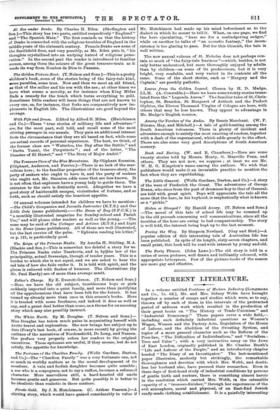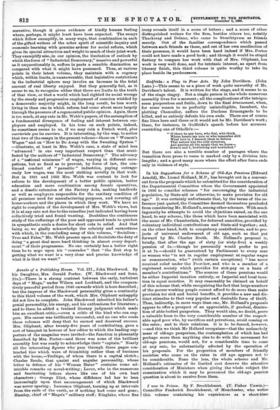CURRENT LITERATURE.
In a volume entitled Problems of Modern Industry (Long-mans and Co., is. 6d.), Mr. and Mrs. Sidney Webb have brought together a number of essays and studies which were, so to say, thrown off by each of them in the intervals of the protracted period of arduous work which resulted in the production of their great books on " The History of Trade-Unionism" and "Industrial Democracy." These papers cover a wide field,— including such definitely industrial questions as Women's Wages, Women and the Factory Acts, Regulation of the Hours of Labour, and the Abolition of the Sweating System, and topics of a more general character such as the Reform of the Poor-law, " The Difficulties of Individualism," and " Socialism : True and False " ; with a very instructive essay on the Jews of East London, originally published in Mr. Charles Booth's "Life and Labour of the People," and an introductory chapter headed " The Diary of an Investigator." The last-mentioned paper illustrates, modestly but strikingly, the remarkable thoroughness and devotion with which Mrs. Webb, and doubt- less her husband also, have pursued their researches. Even in these days of first-hand study of industrial conditions by persons of gentle birth and nurture, there is something almost heroic in the resolution which carried Mrs. Webb, in the ostensible capacity of a "trousers-finisher," through her experiences of the evil atmosphere, moral and physical, of an East-End Jewish ready-made clothing establishment. It is a painfully interesting narrative, though it gives evidence of kindly human feeling where, perhaps, it might least have been expected. The essays which follow exemplify, in many ways, that combination in each of the gifted writers of the sober spirit of scientific inquiry and economic learning with genuine ardour for social reform, which gives its special attraction and weight to much of their joint work. They exemplify also, in our opinion, the limitation of outlook by which the force of " Industrial Democracy," massive and powerful as it unquestionably is, suffers in parts a sensible diminution as compared with what it might have possessed. Thus, at various points in their latest volume, they maintain with a cogency which, within limits, is unanswerable, that legislative restrictions in the industrial sphere may involve an increase in the total amount of real liberty enjoyed. But they generally fail, as it seems to us, to recognise either that there are limits to the truth of that view, or that a world which had righted its social wrongs by the steady and progressive employment of coercion wielded by a democratic majority might, in the long result, be less worth living in than one in which reform had come about more largely through the pressure of a regenerated public opinion. Again, there is too much, at any rate in Mr. Webb's papers, of the assumption of a fundamental divergence of feeling and interest between em- ployers and employed. In his tone on such points, indeed, he sometimes seems to us, if we may coin a French word, plus ouvrieriste que les ouvriers. It is interesting, by the way, to notice that two of the essays in the present volume—those on " Women's Wages " and on " How to Do Away with the Sweating System " —illustrate, at least in Mrs. Webb's case, a state of mind less " advanced " in one very important respect than that mani- fested by the authors of " Industrial Democracy." The advocacy of a "national minimum" of wages, varying in different occu- pations, but so fixed as to prevent, by force of law, the con- tinued conduct of " parasitic " industries, paying outrage- ously low wages, was the most striking novelty in that work. But in 1891 and 1892 Mrs. Webb was content to look for reform to the development of a better public opinion, better education and more combination among female operatives, and a drastic extension of the Factory Acts, making landlords as well as employers responsible for the sanitary condition of all premises used for manufacturing purposes, and covering all home-workers and the places in which they work. We have no right to complain of the development of Mrs. Webb's views, but it is at any rate not due to the remedies just indicated having been collectively tried and found wanting. Doubtless the continuous study of the sufferings of the poor and oppressed tends to quicken in sympathetic souls a desire for short cuts to relief. And that being so, we gladly acknowledge the sobriety and earnestness with which, in the concluding essay of this volume, " Socialism : True and False," Mr. Webb presses upon all Socialists the duty of doing " a great deal more hard thinking in almost every depart- ment" of their programme. No one certainly has a better right than he to urge upon his " comrades " that " the first step to getting what we want is a very clear and precise knowledge of what it is that we want."























































 Previous page
Previous page